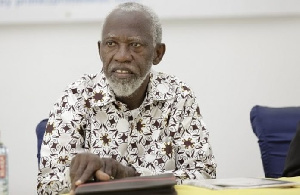 Renowned Ghanaian academician and economist Professor Stephen Adei
Renowned Ghanaian academician and economist Professor Stephen Adei
Renowned Ghanaian academician and economist Professor Stephen Adei has taken a swipe at Parliament over its decision to direct the Attorney-General to compel the General Legal Council to admit some 499 law students who argue they passed their examination but were unjustly denied admission into the Ghana School of Law.
Professor Adei holds that the Parliament of Ghana overstepped its boundaries in issuing that that order as it does not fall within its purview to determine admission into the law school.
Calling the decision ‘rushed,’ Professor Adei opined on Asaase Radio on Sunday, November 7, 2021, that Parliament should have exercised some restraint and considered its powers before issuing the directive. ‘
He said that the directive has set the Parliament and Judiciary on a collision course that could land at the Supreme Court.
He said, “I don’t think that so far there has been any indication that there was a certain standard which was set and changed. It’s not true…There is an unnecessary hype in the sense that … Parliament has come in to give directives; I think that… they acted wrongly.
“They were a bit too rush. Parliament is there to make laws. Parliament is not there to decide admission criteria to a university and I hope that they [Parliament] and Attorney General can settle it and not escalate it. Because if they do, unfortunately, the only thing is that they have to go to the Supreme Court for them to interpret whether the Constitution allows Parliament to do so which they must try and avoid because if they don’t, it will not be good for either institution.
“…I think it will be important for us to note that … more and more people want to do law but at the moment our facility is very limited. We must look for a long-term solution and not an immediate one.”
Prof Adei added, “I’m not a lawyer but my personal position is this; probably the General Legal Council should convert themselves into an institution such as the Chartered Institute of Marketing or Accountancy, they only examine and allow other institutions which can train them [lawyers] of course they must make sure that those who are training them have the requisite qualifications and experience because in this case it’s not a matter of academic training … and then they’ll come and do the examination.
“For example, when people go and do ACCA and 5000 do it and only 50 pass nobody accused them and I think that in the long run, there may be the need for more law schools.”
Did Parliament order the GLC
Professor Adei’s criticism of Parliament was premised on the notion that the resolution passed by Parliament was to the GLC to admit the students.
But Rockson-Nelson Dafeamekpor, a member of Parliament’s Legal and Constitutional Committee has clarified that the subject of the resolution was the office of the Attorney-General who represents the executive on the GLC.
Reacting to a response by the Attorney-General on the resolution, Dafeamekpor said ““He made an emotional reaction. He said that in any case, the president has instructed him to do what we ordered but as a good statesman what he should have said was that we have received the Parliament’s resolution but we have also received a directive from the president to do that, so we want to assure Parliament that we will resolve the issue as the president has directed and come back to Parliament and brief the house. This is how you speak.
“His statement was in a bad taste. We were not impressed with the tone of the letter. The Attorney-General has forgotten that under Article 103 Clause 3, we have powers to make inquiries on the activities of departments and others. The General Legal Council is not part of the judiciary so we have the power to supervise their job. The law that sets up the GLC is not like that. The GLC is a creation of Parliament.
“Under the act, we gave the Attorney-General the power to issue administrative and functional directives to the GLC and they are supposed to obey it. The Attorney-General is also accountable to Parliament. The resolution we passed was in two phases. The original one passed directed at the GLC and a consequential order to Attorney-General to ensure that the directive is followed,” he said.